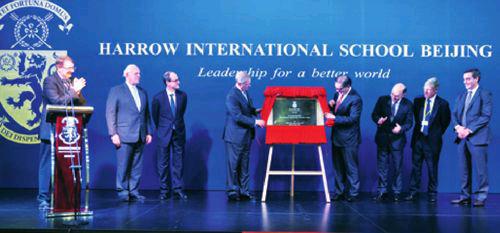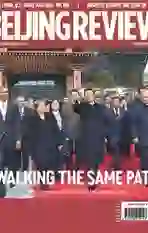A Private Matter
2014-12-19ByDingYing
By+Ding+Ying
A full choir, staged scenes from a musical drama, affluent teenage students of various nationalities and backgrounds. No, this isnt a scene from Gossip Girl, but the joint celebration of the opening of a new campus and the schools 10th anniversary at Harrow International School Beijing, the Beijing branch of the renowned British educational institution.
Alongside Chinas economic development, many private schools have set down roots in China. In Beijing, there are dozens of international schools giving lessons in English. In the meantime, the popularity of traditional Chinese private schools is also on the rise. These private schools typically charge high tuition fees, but this has not dissuaded many parents from sending their children to such institutions owing to various considerations.
Inside private schools
Harrow International School Beijing could justifiably be termed as one of the Chinese capitals“blue blood” international schools, built on the model of elite British public schools. Unlike their Chinese counterparts, Englands public schools are in fact, somewhat confusingly, private schools which are open to the public but not government-owned. In its native Britain, Harrow School has a history stretching back 400 years with graduates such as the famous poet George Gordon Byron and Winston Churchill, Britains much-revered prime minister who served office during World War II.
Established in 2005, Harrow International School Beijing is a full-time international school with a student population of 700 from 33 countries and regions, ranging from 2 to 18 years of age. The school has 104 teachers from Britain and other members of the Commonwealth of Nations. It rarely accepts pupils of Chinese nationality before the high school phase, except those from Hong Kong or Macao. The students of the Upper School (ages 13 to 18), Prep (ages 10 to 13) and Pre-Prep (ages 5 to 10) levels each enjoy their own distinct areas and facilities. The school has top-level sport, performing arts and study facilities as well as a pleasant environment in common with most international schools.
The British have long been proud of their education system. “Regarding British education, there is a slight difference to other forms of education given in English. There is an element of culture. That culture comes from years and years of experience in education. Harrow School in Britain has long experience in educating future leaders,” said the Duke of york, Prince Andrew of Britain, in his speech on October 24 at Harrow International School Beijing.
Harrow International School Beijing is an archetypical British public school. Its academic structure is based on the house system, mostly familiar to non-Brits through the Harry Porter series of novels and movies. The students all wear the same uniform, but different ties, because the school is divided into six houses each distinguished by its own individual color. In a manner reminiscent of J. K. Rowlings stories, students in the same grade take classes together, while the six houses compete against each other in sports, games and other activities. Each house has several close personal tutors. “Every tutor takes care of 15 students of different ages during their time at school, and is very familiar with aspects of each students situation such as their parents and skills,” said Nicholas Rickford, Supervisor of the yellow House.
Most international schools take their curricula from either the British or U.S. education systems, and most students in international schools plan to attend colleges and universities overseas. According to Rickford, Harrow Beijings curriculum basically is the same as that of Harrow School in Britain, except that all students here receive a bilingual education in English and Mandarin from kindergarten up. Many of Harrow Schools longstanding traditions have been maintained too, such as a charity week every year, during which students engage in activities such as fundraising for a local orphanage. There is also an expedition week in which students meet outdoor challenges. Due to the curriculum schedule, its easier for students in Harrow Beijing to get into prestigious institutes of higher learning. Last year, many of Harrow Beijings graduates went to prominent colleges and universities in Britain and the United States.
Private schools in Beijing are generally expensive. The annual fee from kindergarten to high school at Harrow Beijing ranges from 141,300 yuan to 249,600 yuan ($23,000 to$40,600). This is a fee level only slightly above average in relation to other international schools, but one hardly affordable to ordinary families in Beijing.
Reasonable choice
Although private schools usually charge high tuition fees, many parents, especially celebrities and the wealthy, nonetheless choose private schools for different reasons.
Wu Jie, the head of several companies scattered across Zhejiang, Guangdong and Beijing, has a 2-year-old son. His parents have wider options for his future education.
“Now we are considering three possibilities: letting the boy receive his education in the United States, Hong Kong or Chinas mainland. If my son were to be schooled on the mainland, an international school would definitely be our top choice,” Wu told Beijing Review. He explained that as the domestic primary and middle school education systems are mainly based on the school district policy, its hard to guarantee that one will get into a good school district. In addition, he pointed out that as the boy is a Hong Kong citizen, public schools will charge extra tuition.
Wu plans to let the boy receive his education in China before 16 so as to allow him to lay a solid foundation for his Chinese language skills. He then intends to send his son to the United States for high school. He opined it will be easier to help the boy get familiar with the Western education system if he enters an international school at home. To him, a good school with what would to him represent a reasonable yearly tuition of up to 200,000 yuan ($32,500) would suffice.
Unlike Wu, Zhu Zengyi, a successful businesswoman working in a financial company in Beijing, chose to let her 6-year-old son imbibe more traditional Chinese culture in an old-style Chinese private school in Beijing as a boarding student.
In old-style Chinese private schools, students take more classes in various facets of traditional Chinese culture encompassing everything from Chinese philosophy, literature and history to traditional Chinese martial arts, music, chess, calligraphy and painting. In parallel, they also follow the curriculum of regular public schools. Most such schools are boarding schools. The students there maintain an old-fashioned schedule: getting up early and sleeping early. Their tuition fees are not as expensive as those of international schools, averaging approximately 30,000 yuan ($5,000) every year.
Zhus parents emigrated from Guangdong Province to the United States when she was a little girl. She went on to work on Wall Street for a couple of years. She then came back to Beijing after the year of the millennium. “As a professional investment manager, I am very confident about Chinas future. I believe traditional Chinese civilization will provide a solid cultural foundation for my sons future,” she explained to Beijing Review.
Zhus son has studied many ancient Chinese classics such as Confucian works, which advocate an orderly society with a sense of propriety, justice, honesty and honor. Zhu talked about the change that took place in her son after a few months in the private school. As is the case in many single-child families, the boy was very self-centered before going to school. Now, not only has he made great progress in terms of how he conducts himself, but has also started to think of others.
Zhu mentioned that she cooked a fish dinner for the boy one weekend, offering a precious opportunity for the family to get together. The boy picked out all of the tiny fish bones from his portion, and presented it for his mother to have the first bite as a gesture of appreciation for her care over past years. “I was moved to tears immediately, and felt all my efforts had been repaid by this act. This is how the old-style school has influenced him. Though it is impossible for everyone to become an outstanding person, he or she can at least grow up to be a decent person,” Zhu stressed.
